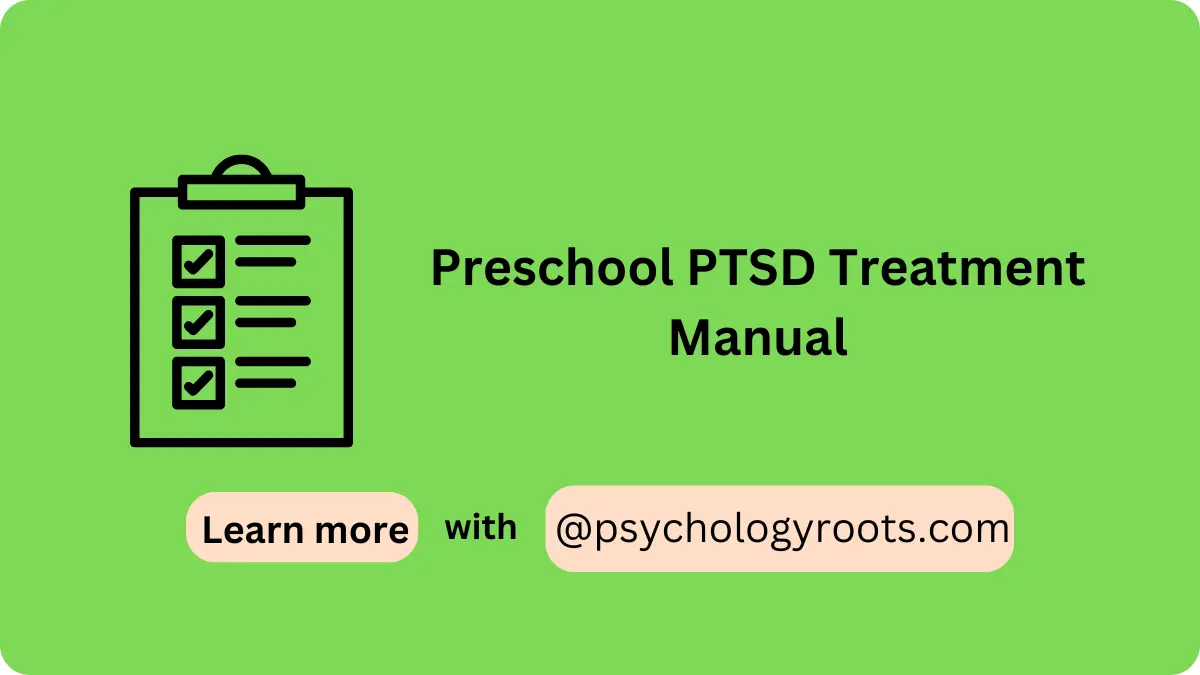Table of Contents
Preschool PTSD Treatment Manual
Here in this post, we are sharing the “Preschool PTSD Treatment Manual”. You can read psychometric and Author information. We have thousands of Scales and questionnaires in our collection (See Scales and Questionnaires). You can demand us any scale and questionnaires related to psychology through our community, and we will provide you with a short time. Keep visiting Psychology Roots.
About Preschool PTSD Treatment Manual
Scale Name
Preschool PTSD Treatment Manual
Author Details
Michael S. Scheeringa, MD, MPH; Lisa Amaya-Jackson, MD, MPH; Judith Cohen, MD
Translation Availability
English

Background/Description
The Preschool PTSD Treatment Manual is a structured, evidence-based guide designed specifically for treating Post-Traumatic Stress Disorder (PTSD) in young children, particularly those aged 3-6 years. Developed by Dr. Michael Scheeringa, Dr. Lisa Amaya-Jackson, and Dr. Judith Cohen, this manual addresses the unique developmental needs of preschool-aged children who have experienced trauma.
It offers a structured framework for clinicians, integrating elements of cognitive-behavioral therapy (CBT) and play therapy. The manual focuses on reducing PTSD symptoms, including re-experiencing, hyperarousal, and avoidance behaviors. It emphasizes caregiver involvement, providing strategies for supporting parents or guardians in managing their child’s recovery process.
This manual is widely used in clinical settings and is considered a cornerstone in early childhood trauma treatment. It has been updated several times, with the latest version being 1.7, released in 2010.
Administration, Scoring and Interpretation
- Obtain a copy of the Preschool PTSD Treatment Manual through authorized clinical or academic sources.
- Explain the purpose: To provide structured PTSD treatment for preschool-aged children who have experienced trauma.
- Provide clear instructions: Clinicians should familiarize themselves with the manual’s structure and adapt sessions to the child’s developmental level. Sessions typically involve both the child and caregiver.
Reliability and Validity
The Preschool PTSD Treatment Manual is grounded in extensive research on early childhood trauma. Studies have demonstrated its effectiveness in reducing PTSD symptoms and improving overall functioning in young children. The manual’s interventions are based on validated therapeutic approaches, such as trauma-focused CBT, which have shown high efficacy in multiple clinical trials. The involvement of leading experts from institutions like Tulane University and Duke University underscores its credibility and reliability.
Available Versions
Multiple-Items
Reference
Scheeringa, M. S., Amaya-Jackson, L., & Cohen, J. (2002). Preschool PTSD Treatment Manual (Version 1.7, updated 2010). Tulane University Health Sciences Center, Duke University Medical Center, and Allegheny General Hospital.
Scheeringa, M. S., Amaya-Jackson, L., & Cohen, J. (2010). Preschool PTSD treatment. Unpublished manuscript, Department of Psychiatry and Neurology, Tulane University Health Sciences Center, New Orleans, LA.
Important Link
Scale File:
Frequently Asked Questions
What is the Preschool PTSD Treatment Manual?
It is a structured guide for clinicians treating PTSD in preschool-aged children using evidence-based techniques.
Who developed the manual?
The manual was developed by Dr. Michael Scheeringa, Dr. Lisa Amaya-Jackson, and Dr. Judith Cohen.
What age group is the manual designed for?
It is specifically designed for children aged 3-6 years who have experienced trauma.
How many sessions does the treatment involve?
The treatment typically involves 12-16 sessions, each lasting 45-60 minutes.
Is caregiver involvement necessary?
Yes, the manual emphasizes caregiver involvement to support the child’s recovery process effectively.
Disclaimer
Please note that Psychology Roots does not have the right to grant permission for the use of any psychological scales or assessments listed on its website. To use any scale or assessment, you must obtain permission directly from the author or translator of the tool. Psychology Roots provides information about various tools and their administration procedures, but it is your responsibility to obtain proper permissions before using any scale or assessment. If you need further information about an author’s contact details, please submit a query to the Psychology Roots team.
Help Us Improve This Article
Have you discovered an inaccuracy? We put out great effort to give accurate and scientifically trustworthy information to our readers. Please notify us if you discover any typographical or grammatical errors.
Make a comment. We acknowledge and appreciate your efforts.
Share With Us
If you have any scale or any material related to psychology kindly share it with us at psychologyroots@gmail.com. We help others on behalf of you.